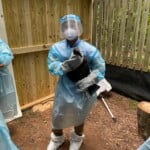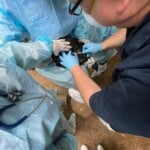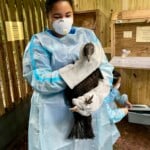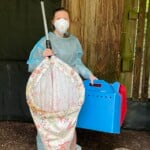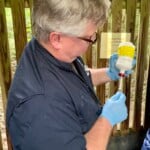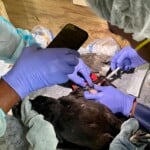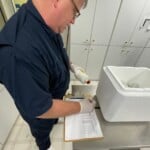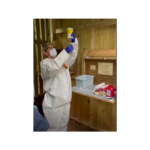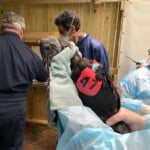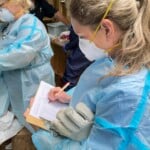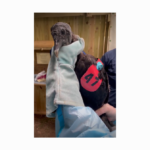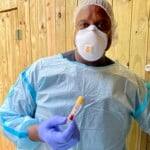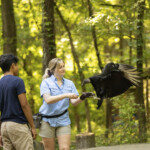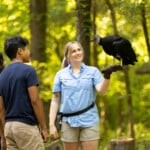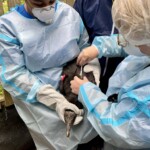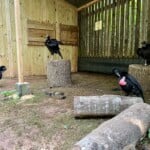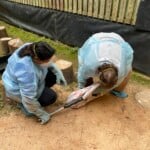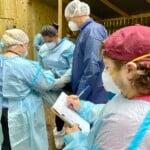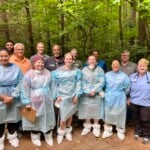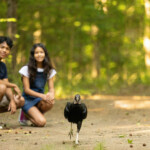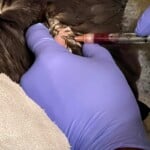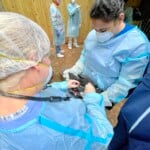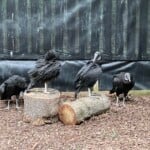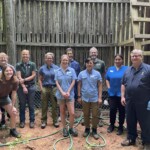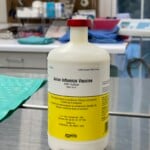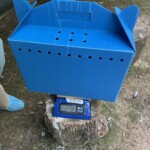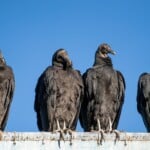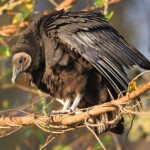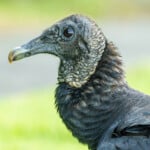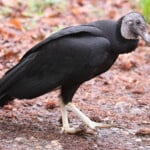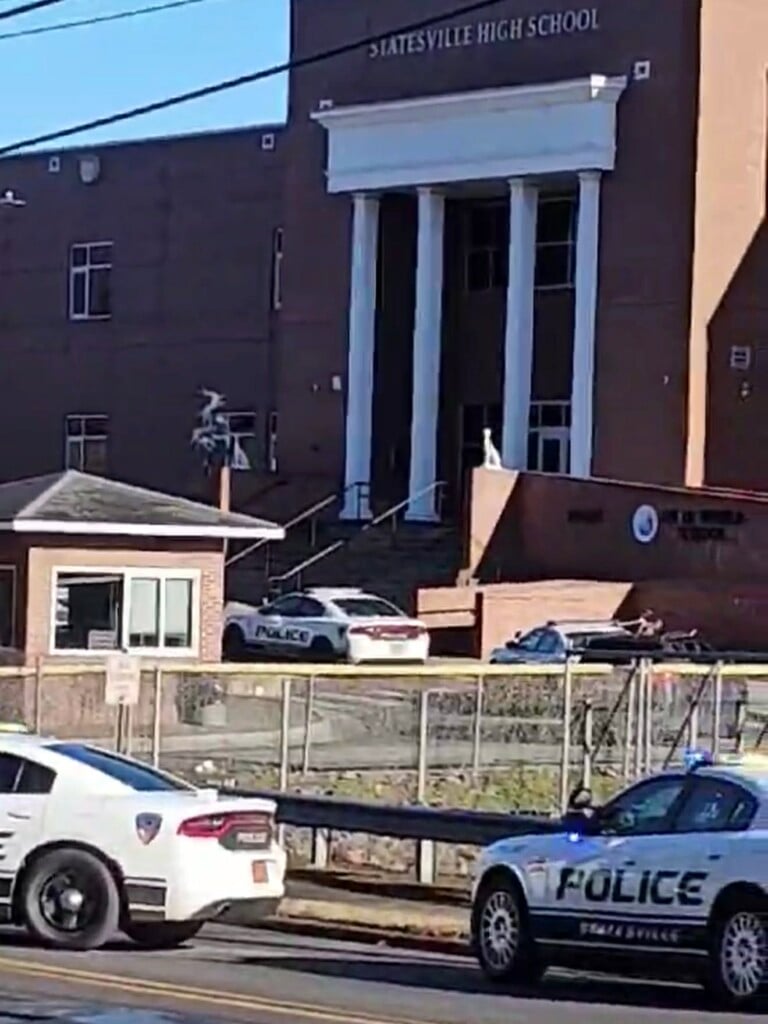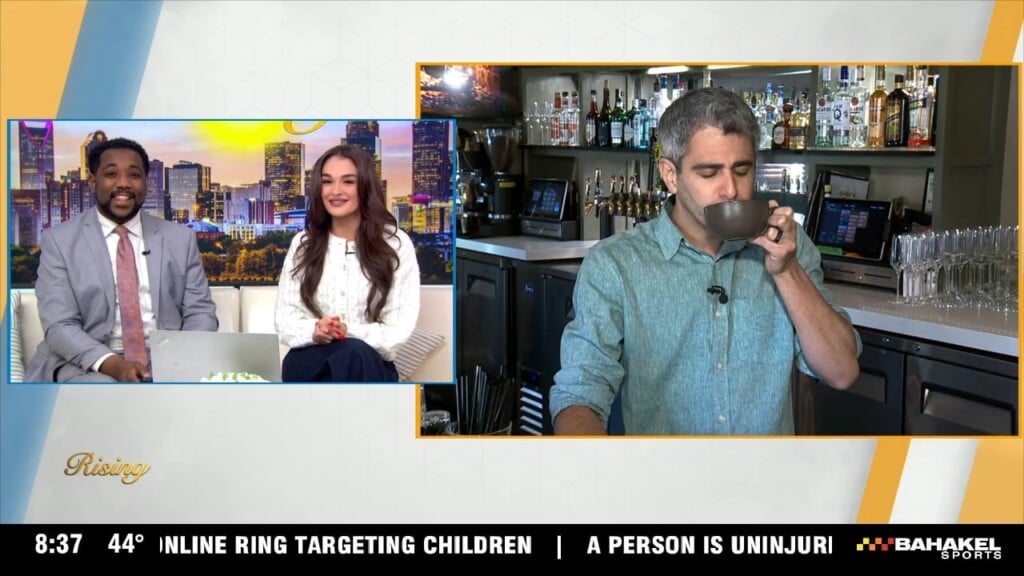Carolina Raptor Center Hosts Emergency Efforts To Help Save Endangered California Condors From Highly Pathogenic Avian Influenza
CHARLOTTE, N.C. (News Release) — The Carolina Raptor Center (CRC) recently became home to 28 Black Vultures that are part of an emergency use vaccine authorization to help protect critically endangered California Condors from Highly Pathogenic Avian Influenza (HPAI). The U.S. Department of Agriculture (USDA) approved the emergency use authorization, and this high-profile and nation-wide collaborative study was initiated after at least 17 condors died and were confirmed positive for HPAI in Arizona in March and April.
CRC was chosen as the host for this trial because of its unique facilities and expertise in the field of raptor rehabilitation and care. “Rescuing and rehabilitating up to 1,000 injured and sick raptors every year requires a team of expert staff as well as large holding facilities to care for birds as they recover,” says President and CEO Erin Katzner. “We’re fortunate to have the space and skill set to care for these incredible vultures in support of their critically endangered relatives – the California Condor. Although this disease has been devastating to condors, we appreciate the opportunity to contribute to conservation by taking part in this critical and cutting-edge research effort. CRC is proud to collaborate with so many impressive partners to save one of the most iconic birds in North America.”
Use of the inactivated vaccine, developed by Zoetis, was authorized on an emergency basis by the USDA and the research study was collaboratively developed by the U.S. Geological Survey (USGS), U.S. Fish and Wildlife Service (USFWS), and USDA. Since the authorized vaccine was not developed for condors, the vultures – which are related to condors – will be participating in a pilot safety study to ensure there are no adverse effects before vaccinating the endangered condors.
The Black Vultures arrived at CRC on May 3, with the help of North Carolina Department of Agriculture and Consumer Services (NCDA&CS), North Carolina Wildlife Resources Commission, Tennessee Department of Agriculture, the Tennessee Wildlife Resources Agency, American Eagle Foundation, and the USDA. The first dose of vaccine was supervised by the NCDA&CS State Veterinarian and administered to 20 birds on May 16 by veterinarians from the USFWS, USDA, and CRC. The team was assisted by scientists from USGS and Zoetis, and CRC Staff. This was the first time an HPAI vaccine has been administered to any bird in the United States outside of development trials. A second dose was given to 10 of the birds on June 6; the remaining eight birds serve as a control group for the trial.
CRC staff spent several days following the initial dose checking injection sites for reactions. No negative reactions to the injections were observed. In addition to the second dose on June 6, blood was drawn from all 28 birds for analysis of titer response which gauges the amount and diversity of antibodies the immune system produces in response to the vaccine.
The study was designed to inform the safety of the poultry vaccine in vultures and will also evaluate the level of vaccine-induced immunity in the vultures. The results of the Black Vulture study will help guide the next steps of trial implementation on 25 captive California Condors. “We are thankful to our partners at the Carolina Raptor Center for assisting with this effort to help address HPAI in condors. The initial results of healthy Black Vultures following vaccination is already informing our planning in a meaningful way,” said Ashleigh Blackford, USFWS California Condor Coordinator.
CRC Director of Avian Operations Kristin Dean reports, “The vultures are all doing well. They’re strong, healthy, and behaving like vultures – which means eating a lot of food!” In the wild, vultures and condors feed almost exclusively on carrion, or dead animals, and serve an important role in our environment as ‘nature’s recyclers.’ “Without vultures cleaning up decaying carcasses,” says Dean, “we would have a lot more bacteria and disease on our landscape – diseases that could get into our waterways or livestock. Vultures are valuable to the health of our world.”
Initial costs for implementing the trial were covered by USFWS, but CRC is requesting donations on their website to help support the additional costs of food, supplies, and health monitoring the vultures will require.
“We would also love to encourage everyone to come visit us this summer,” says Katzner. “While the vultures in the study are not available for viewing, we have a number of resident vultures at the center. You may even have the chance to meet Nebari a Black Vulture who is one of our Avian Ambassadors and participates in daily special programming – he’s trained to fly over guests’ heads and offer nose-to-beak experiences. It’s hard not to love a vulture once you’ve met one.”
Additional information on condors and these trials is at:
CRC – https://carolinaraptorcenter.org/vulture-condor-vaccine
USDA – https://www.aphis.usda.gov/aphis/newsroom/stakeholder-info/sa_by_date/sa-2023/ca-condor-hpai
USFWS – https://www.fws.gov/story/2023-05/california-condor-hpai-response-update-may-5-2023
